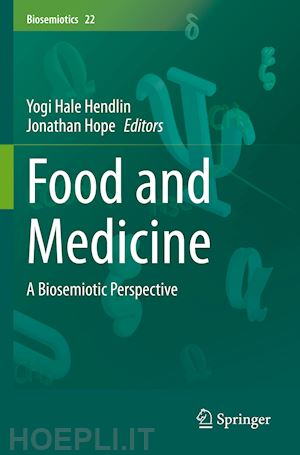
Questo prodotto usufruisce delle SPEDIZIONI GRATIS
selezionando l'opzione Corriere Veloce in fase di ordine.
Pagabile anche con Carta della cultura giovani e del merito, 18App Bonus Cultura e Carta del Docente
This edited volume provides a biosemiotic analysis of the ecological relationship between food and medicine. Drawing on the origins of semiotics in medicine, this collection proposes innovative ways of considering aliments and treatments. Considering the ever-evolving character of our understanding of meaning-making in biology, and considering the keen popular interest in issues relating to food and medicines - fueled by an increasing body of interdisciplinary knowledge - the contributions here provide diverse insights and arguments into the larger ecology of organisms’ engagement with and transformation through taking in matter. Bodies interpret molecules, enzymes, and alkaloids they intentionally and unintentionally come in contact with according to their pre-existing receptors. But their receptors are also changed by the experience. Once the body has identified a particular substance, it responds by initiating semiotic sequences and negotiations that fulfill vital functions for the organism at macro-, meso-, and micro-scales.
Human abilities to distill and extract the living world into highly refined foods and medicines, however, have created substances far more potent than their counterparts in our historical evolution. Many of these substances also lack certain accompanying proteins, enzymes, and alkaloids that otherwise aid digestion or protect against side-effects in active extracted chemicals. Human biology has yet to catch up with human inventions such as supernormal foods and medicines that may flood receptors, overwhelming the body’s normal satiation mechanisms. This volume discusses how biosemioticians can come to terms with these networks of meaning, providing a valuable and provocative compendium for semioticians, medical researchers and practitioners, sociologists, cultural theorists, bioethicists and scholars investigating the interdisciplinary questions stemming from food and medicine.
Yogi Hendlin is assistant professor in the Erasmus School of Philosophy and Dynamics of Inclusive Prosperity Initiative at Erasmus University Rotterdam, research associate in the Environmental Health Initiative at the University of California, San Francisco, and Editor-in-Chief of the journal Biosemiotics.”











Il sito utilizza cookie ed altri strumenti di tracciamento che raccolgono informazioni dal dispositivo dell’utente. Oltre ai cookie tecnici ed analitici aggregati, strettamente necessari per il funzionamento di questo sito web, previo consenso dell’utente possono essere installati cookie di profilazione e marketing e cookie dei social media. Cliccando su “Accetto tutti i cookie” saranno attivate tutte le categorie di cookie. Per accettare solo deterninate categorie di cookie, cliccare invece su “Impostazioni cookie”. Chiudendo il banner o continuando a navigare saranno installati solo cookie tecnici. Per maggiori dettagli, consultare la Cookie Policy.